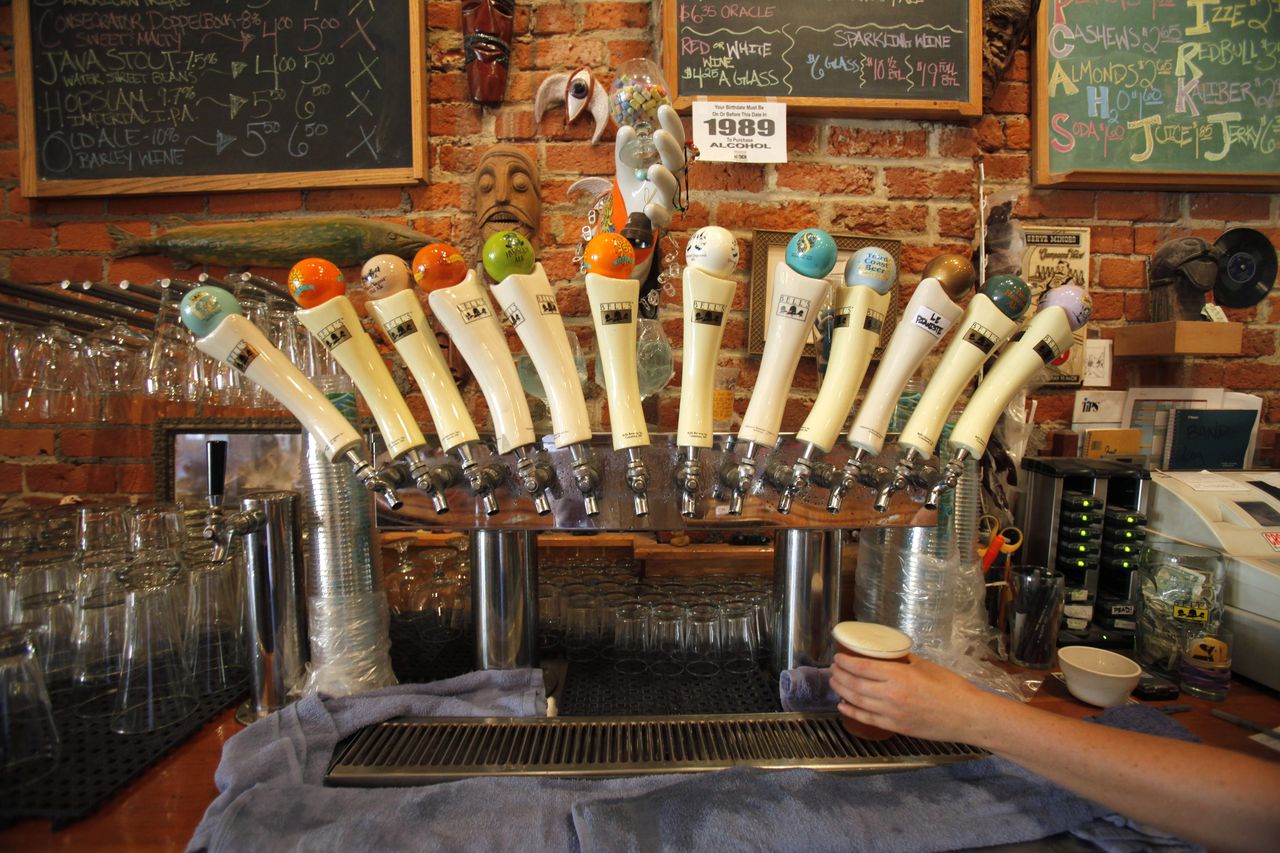KALAMAZOO, MI – Michigan’s craft brewers are saying “cheers” to Bell’s Brewery founder Larry Bell following Wednesday’s announcement of his retirement and the sale of his brewery to Australian-based beverage company, Lion..
And, they wouldn’t characterize the sale as a craft brewer selling out.
Scott Graham, executive director of the Michigan Brewer’s Guild, said the sale was a natural next step for Bell’s Brewery.
“With success in the length of a business, you have to make plans and evolve and adapt and change,” Graham said.
Bell’s will join forces with Colorado-based New Belgium Brewing Co., purchased by Lion in 2019. The two American craft beer giants will unite under the same leadership team, once the sale goes final in the coming months.
While Kalamazoo’s beloved independent brewery is being sold to a global “big beer” company, Michigan brewers contacted by MLive say this isn’t a sell-out situation.
Chris O’Neill, owner of Kalamazoo’s One Well Brewing, praised Bell’s decision to sell his business and retire.
“We all hope to retire one day, and at Larry’s age, I think that’s great for him to retire,” O’Neill said. “How do you get out from a business that you grew? Just like in any business, it’s usually selling. Somebody has to take that torch and run with it, so either you’re still financially on the hook for it or you sell it off to somebody else.”
Bell’s, which opened in Kalamazoo in 1983 as a small home brewing supply shop, has grown into an internationally known beer brand that helped put Michigan on the map for craft brewing.
RELATED: As Bell’s sells to global beer company, a look back at its history as Kalamazoo’s signature brewery
Last year, it was ranked as the seventh largest craft brewery in the country and the 16th largest overall brewing company by the Brewers Association, which represents small and independent craft brewers.
Bell’s Two Hearted Ale was ranked as the No. 1 craft beer in America by the American Homebrewer’s Association.
Bell, 63, said he’s been thinking about retirement for a few years now. The board of directors at Bell’s voted in January to begin exploring the sale of the company, and Bell said this was the “right time” for him to step down and focus on his health.
Brett Vanderkamp, founder of New Holland Brewing Company, said he doesn’t think a sale like this will shake up the local brew scene today like it might have in the past.
“I don’t see these sales are as high-profile and prevalent as they used to be,” he said. “Ten years ago, the industry was a different space than it is now, and now I think they’re more generational and when folks are looking at the future, they’re not sure, you know, what is their legacy going to be? I think (sales) happen more for those reasons now.”
Vanderkamp said “time will tell” how the sale of Bell’s will impact its brews – but, he noted, there are cases when companies change but their beers live on.
“I think who you’re partnered with and they values they hold and where they want to take the company is obviously critical,” the New Holland president said.
Bell said he feels confident in the partnership with New Belgium, noting that the Colorado-based company shares his brewery’s “ironclad commitment to the craft of brewing and the community-first way we’ve built our business.”
New Belgium is a fellow craft beer giant that has traveled a similar path from humble beginnings in a Colorado college town in 1991 to nationwide distribution in recent years. Notable New Belgium brews include Fat Tire and Voodoo Ranger IPA.
New Belgium CEO Steve Fechheimer, a Michigan native who has been with the brewing company since 2017, will head up a combined company leadership team that oversees the two breweries.
In addition to soon-to-be two major American craft breweries, Lion, which is a wholly-owned subsidiary of Japanese company Kirin Holdings, has a portfolio that includes craft breweries in the UK, wineries in California and Oregon and a number of beers, ciders, wines, spirits, coffees and kombuchas worldwide.
Lion also leads the way in distributing major brands such as White Claw, Heineken, Corona, Stella Artois, Budweiser, Smirnoff, Johnny Walker and Wild Turkey in New Zealand and Australia.
When a local, independent company is sold to an international buyer like Lion, Vanderkamp said there can be some skepticism among craft beer lovers. Owner independence brings a huge sense of pride to the brewing community, he said.
“There’s a vein that runs through the craft brewers that really celebrates independence and being able to have autonomy in how we make our decisions and choices, and making sure that we’re tied directly back to the local communities that we serve,” he said.
The community shares a feeling of ownership over the local company and its brand, Vanderkamp said.
“There’s a magnetism there when someone can speak very highly of (the company’s) founder, and they’re friends with the founder, and there’s a sense of ownership and pride that comes with that,” he said. “When that disappears, I think things change and people get nervous that things may drift from the origin of the company.”
But Fechheimer said just because Lion is involved with major corporate brands doesn’t mean anything should be expected to change at the local level.
Graham said he thinks Bell’s lovers will be able to continue enjoying the same brews they’ve enjoyed for years.
“I think the practical result is, I don’t think (the sale) is going to change a lot for those of us who have enjoyed Bell’s beer for many years,” he said.
More on MLive:
Whitmer signs bill allowing Michigan drivers two-year vehicle registrations
Historic Michigan B&B hits market for $3.5M, comes with staff, furnishings for next innkeeper
100-year-old Michigan WWII veteran one of the last living witnesses to Nazi Nuremberg trials
